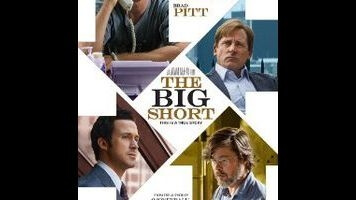The Big Short builds a smart comedy out of the 2008 mortgage crisis

At first glance, Adam McKay’s career as a movie director may look like the most single-minded one this side of Dennis Dugan: His first five features were all collaborations with his Saturday Night Live soulmate Will Ferrell. But within the McKay/Ferrell oeuvre and its clear style, there is an equally clear comic range, from the demented free-for-alls of Anchorman and Step Brothers to the more focused satire of Talladega Nights and The Other Guys. McKay’s first non-Ferrell film, The Big Short, seems to spin off from the latter—specifically, from its barrage of angry end-credits stats about the financial crisis, which was touched upon in its semi-absurdist cop-spoof plot.
The Big Short is also a comedy of sorts, but it’s stocked with A-listers instead of comic ringers: Christian Bale, Ryan Gosling, Brad Pitt, and sole McKay rep-company holdover Steve Carell play characters adapted from the Michael Lewis nonfiction book of the same name, who have all caught wind that the financial crisis of 2008 is coming, and are trying to “short” the housing market by betting big on its collapse. Michael Burry (Bale), a doctor turned hedge fund manager, notices the bubble first by studying data on mortgage packages, and convinces banks to let him set up investments that bank on the probability of bad loans going belly-up.
Played by Bale with a receding, gummy grin, plenty of nervous air-drumming, and a difficulty with human small talk (“You have a very nice haircut—did you do it yourself?”), Burry’s lack of slick polish makes him easy for some in the financial world to dismiss. One early adopter of his collapse theory (according to Burry, more of a certainty) is Mark Baum (Carell), a malcontent who works in finance but appears helplessly unable to avoid saying what’s on his mind, which includes a festering resentment of the big banks. He teams up with smarmy trader Jared Vennett (Gosling) for their own shorting scheme. The movie’s heroes, such as they are, look like con artists in reverse: They’re guys conspiring to rip off the banks simply by observing the banks’ faulty procedures (and the outright lies of rating agencies) and betting that, as Baum explains, fraud can only work for so long.
As a narrative, The Big Short puts up a major risk of anticlimax; a lot of it is explanation of how the housing bubble grew and why it will burst, and then waiting around for that to actually happen. (Burry apparently had a sizable lead time on anticipating what finally went down in 2008.) The waiting game involves Baum and his guys researching the claims made by Burry about these bad mortgages, which isn’t an inherently exciting process, but functions as a series of darkly comic citations. Baum’s insider outrage generates a lot of the movie’s best lines, like this incredulous exchange responding to cocky lenders discussing their bad loans: “Why are they confessing?” “They’re not confessing. They’re bragging.”
Though much of the movie is fast and funny, McKay is clearly gunning for a more serious brand of comedy, controlling his usual comic anarchy into mere irreverence. He signals his intentions by switching up his filmmaking style. McKay’s broad comedies are underrated for their pragmatic combination of gag-goosing framing and improv-friendly coverage; The Big Short goes for a docudrama look with handheld and often close-up camera work, jumpy focus, and some pointless surveillance-style freeze frames. Some of the effort at seriousness feels a little sweaty, but it also has its own snappy energy, especially when McKay knowingly breaks format: Gosling sometimes addresses the camera directly, and occasionally the movie cuts away to a series of financial process explanations performed by attention-grabbing celebrities (like “Margot Robbie in a bubble bath,” as the movie puts it). McKay seems to regard his film as some form of edu-tainment, using his big-name cast and guest stars to get across the absurdity and outrage of the 2008 crisis.
Moviegoers excited to witness intra-star fireworks on the way to the righteous outrage, however, may leave disappointed. Of the four main actors, only Carell and Gosling share any substantial scenes, and even some of those look like they may have been spliced together in post-production (the two actors’ faces rarely share a frame). Pitt in particular is very much pulling a 12 Years A Slave, appearing in an agreeable but unchallenging supporting role to help out a movie coming from his production company. Bale, Gosling, and Carell, though, are all well-cast and compelling; in the end, McKay’s edu-tainment tactics work, even if the laughs aren’t as hearty as his broader work with Ferrell. The Big Short pulls off its own oddball gambit: grabbing attention through fringe wonkiness rather than a tantalizing glimpse at bro-banker lifestyles.